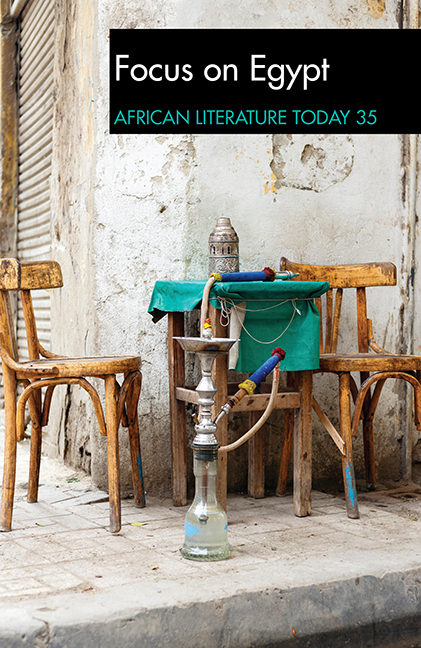Book contents
- Frontmatter
- Dedication
- Contents
- Notes on Contributors
- Foreword
- EDITORIAL ARTICLE
- ARTICLES
- Coping with a Failed Revolution: Basma Abdel Aziz, Nael Eltoukhy, Mohammed Rabie & Yasmine El Rashidi
- The Complications of Reading Egypt as Africa: Translation & Magdy el-Shafee's مترو (Metro)
- Narratives of the ‘Nubian Awakening’: Reclaiming Egypt's African Identity
- Frantz Fanon's Conceptualization of Decolonization in Sonallah Ibrahim's The Committee
- Romance as Epistemological Aesthetic in the Fiction of Ahdaf Soueif
- Literature as Prophecy: Re-Reading Yusuf Idris's The Cheapest Nights
- Travel & Discovery: Hopes for a New Egypt in Mohamed Salmawy's Butterfly Wings
- The Symbolic Relevance of the Use of the Eye in Nawal El Saadawi's Two Women in One & God Dies by the Nile
- African Epics: A Comparative Study of Sundiata & Al-Sirah al-Hilaliyyah
- Conversations with Nawal El Saadawi: Online interview
- FEATURED ARTICLES
- LITERARY SUPPLEMENT
- TRIBUTE
- REVIEWS
- Reviews of Nigerian Poetry
Conversations with Nawal El Saadawi: Onlineinterview
from ARTICLES
Published online by Cambridge University Press: 24 August 2019
- Frontmatter
- Dedication
- Contents
- Notes on Contributors
- Foreword
- EDITORIAL ARTICLE
- ARTICLES
- Coping with a Failed Revolution: Basma Abdel Aziz, Nael Eltoukhy, Mohammed Rabie & Yasmine El Rashidi
- The Complications of Reading Egypt as Africa: Translation & Magdy el-Shafee's مترو (Metro)
- Narratives of the ‘Nubian Awakening’: Reclaiming Egypt's African Identity
- Frantz Fanon's Conceptualization of Decolonization in Sonallah Ibrahim's The Committee
- Romance as Epistemological Aesthetic in the Fiction of Ahdaf Soueif
- Literature as Prophecy: Re-Reading Yusuf Idris's The Cheapest Nights
- Travel & Discovery: Hopes for a New Egypt in Mohamed Salmawy's Butterfly Wings
- The Symbolic Relevance of the Use of the Eye in Nawal El Saadawi's Two Women in One & God Dies by the Nile
- African Epics: A Comparative Study of Sundiata & Al-Sirah al-Hilaliyyah
- Conversations with Nawal El Saadawi: Online interview
- FEATURED ARTICLES
- LITERARY SUPPLEMENT
- TRIBUTE
- REVIEWS
- Reviews of Nigerian Poetry
Summary
1 Canwe as African women use the word Feminism withoutdistancing ourselves from Western Feminism? InArabic we say ‘Tahrir El Maraa’ whichmeans: Women's Liberation, which means Feminism. All ofthese words, in different languages, refer to liberatingwomen and children from the historical patriarchalcapitalist racist imperialist colonial religious system,dominating the West and the East, the North and the South.We live in One World, not Three Worlds, dominated by thesame oppressive system, globally and locally. We use oneword today which is: ‘glocally’.
2 Whatare the kinds of changes we would like to see in north/south relations and gender relations? We needto build a new world system based on: freedom, dignity,justice and equality for all peoples, regardless ofnationality, religion, gender, class, race, colour,language, sect, creed, or any other so-called ‘identity’differences.
3 Areall traditional societies pitted against women?What do you mean by ‘traditional societies’? In AncientEgyptian society, for example, women were goddesses ofknowledge, justice and medicine. But I think that allpatriarchal feudal capitalist religious traditional, modernand post-modern societies are pitted against women.
4 Howare your books received in the Arab world, especially inyour country Egypt? Are they taught in schools?Men and women in Egypt and other Arab countries havereceived my books very well since my first novel waspublished, in 1958 under the title: ‘Memoir of a WomanDoctor’. The governments of Egypt did not allow my books tobe taught in schools, but they were taught in schools insome Arab countries like Tunisia, Libya, Syria, Lebanon,Yemen, Sudan and others.
5 Hasthe condition of women improved significantly (in termsof human rights) in your home land between the time youwere a young woman and now you are much older?The condition of women in Egypt and Arab countries changed,and is changing to the better, every day, in spite ofcapitalist colonial global and local powers trying toexploit women and the poor.
6 Doyou still write fiction? What are the things that occupyyour time these days? Yes I still writefiction. I am now writing my new novel. In fact I have beenwriting fiction and nonfiction since childhood. In myopinion, fiction and nonfiction (facts) are inseparable.Dreams, imagination, the subconscious, are all part ofreality.
- Type
- Chapter
- Information
- ALT 35: Focus on EgyptAfrican Literature Today 35, pp. 152 - 158Publisher: Boydell & BrewerPrint publication year: 2017



